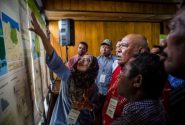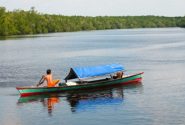While opinions vary about what exactly good forest governance means, participants in the Oaxaca workshop dealing with this subject agreed passionately that it is critical if REDD+ is to succeed in creating powerful new financial incentives for sustainable forest management.
That accounted perhaps for the energy driving a day of intense discussions on “people, forest governance and forests,” the first of the workshop’s four main themes. Four research papers laid the foundation for these exchanges, uncovering the deep roots of current governance arrangements and revealing the many barriers to change while also pointing to positive signs, such as sweeping land tenure reforms, which have clarified the rights of rural communities, including many indigenous groups.
Political decentralization is another notable governance shift in Latin America during recent decades from which forests and forest dwellers have benefitted. Some analysts fear that REDD+ will reverse this trend, as governments recentralize forest management both to control incoming funds and to assume responsibility for how they are used to reduce carbon emissions. But evidence presented from Brazil suggests that, on the contrary, central governments will be compelled to strengthen local authorities, since their support will be essential for monitoring REDD+ schemes over vast territories.
Clearly, REDD+ entails risks but also rewards. By building on governance successes, it could accelerate the policy and institutional changes that are needed to sustain forests. For example, REDD+ schemes relying on community-based forest management could prove instrumental in reconciling the dissimilar goals of climate change mitigation and adaptation. But if REDD+ is perverted by governance failures, it could end up lining the pockets of powerful elites and placing new burdens on the rural poor, without reducing carbon emissions.
Hoping to help tip the balance in the right direction, workshop participants joined the search for practical ways to enhance forest governance through a series of round-table sessions. Together, they identified a set of basic requirements, including clear policy leadership, continued decentralization and greater transparency in key decisions. In addition, they recommended that agencies from outside the forestry sector take part in the REDD+ debate to help find ways of reducing demographic and economic pressures on forests, and they stressed the importance of collective decision making not just with communities but at the international and national levels as well.
how to earn money fast
We want you to share Forests News content, which is licensed under Creative Commons Attribution-NonCommercial-ShareAlike 4.0 International (CC BY-NC-SA 4.0). This means you are free to redistribute our material for non-commercial purposes. All we ask is that you give Forests News appropriate credit and link to the original Forests News content, indicate if changes were made, and distribute your contributions under the same Creative Commons license. You must notify Forests News if you repost, reprint or reuse our materials by contacting forestsnews@cifor-icraf.org.











